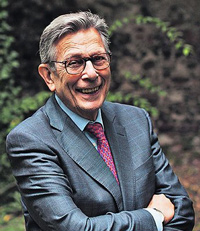Join the Indiana Council on World Affairs (ICWA) for its first-ever virtual Meet & Greet with Norman Sartorius from 5 from 5:30 p.m. on Thursday, Nov. 19. This will be a unique opportunity for an informal conversation with Dr. Sartorius from his home in Geneva, Switzerland.

Sartorius
ICWA is offering this premium program as a “global social hour” to get to know the distinguished speaker and learn about his current priorities.
Participants can discuss Dr. Sartorius’ long career dedicated to improving mental health care, reducing stigma, and increasing access to services for people with mental illness around the world.
There will be limited-access to the Meet & Greet and a small charge of $15 for ICWA members and $20 for non-members, so secure your spot today. If you would like to become a member of ICWA, visit IndianaWorld.org.
Access to the “Conversation with Norman Sartorius” Webinar is still free of charge and will take place after the Meet & Greet from 6 to 7:30 p.m.
About the conversation
The COVID-19 global health crisis illustrates many of the transnational governance challenges the United States faces today. In today’s interconnected world, health has moved beyond being “just” a humanitarian issue to being one with national economic and security interests.
The United States was among the biggest champions for establishing an international agency to assist countries in rebuilding national health systems. The United States’ compulsory and voluntary financial contributions have helped the World Health Organization (WHO) to carry out life-saving work in low- and middle-income countries and regions – for example, in treating Ebola, HIV and polio. And U.S. public-health researchers and policymakers are embedded in the organization’s many research and policy-making bodies.
But recently, the White House announced that the United States is withdrawing its support for WHO and will not take part in a global effort led by WHO to develop and distribute a vaccine for the coronavirus.
In this timely session, Dr. Norman Sartorius, who was employed at the WHO for 25 years, will review the history and mandate of the organization and the roles that the U.S. has played since its inception. He will convey how it benefits the U.S. to be engaged in the work of WHO and what is likely to result from its absence both in terms of who will fill those voids and the potential negative outcomes.
Dr. Sartorius will also describe the development of the mental health program of WHO and the work that he and his successors have done to put mental health on the agenda and to improve the care and treatment of persons with mental illness around the world – a subject closely related to the wide-ranging impact of a global pandemic on all aspects of health.
More about Sartorius
Professor Norman Sartorius, M.D., M.A., D.P.M., Ph.D., FRC. Psych., was the first Director of the Division of Mental Health of WHO, a position which he held until mid-1993. In June 1993, Professor Sartorius was elected President of the World Psychiatric Association (WPA) and served as its President until August 1999. Subsequently he became President of the Association of European Psychiatrists (EAP). He is currently the President of the Association for the Improvement of Mental Health Programmes and a member of the Geneva Prize Foundation having been its President from 2004 through 2008. Dr Sartorius holds professorial appointments at the Universities of London, Prague and Zagreb and at several other universities in the USA and China.
Dr. Sartorius has published nearly 500 articles in peer-reviewed scientific journals and authored, co-authored or edited more than 100 books.
Dr Sartorius obtained his M.D. in Zagreb (Croatia). He specialized in neurology and psychiatry and subsequently obtained a Masters Degree and a Doctorate in psychology (Ph.D.). He has also received honorary doctorates from universities in the Czech Republic, Denmark, Romania, Sweden and the U.K., and is an honorary fellow of the Royal College of Psychiatrists of the United Kingdom of Great Britain, and of the Royal Australian and New Zealand College of Psychiatrists and a Distinguished Fellow of the American Psychiatric Association. He is an Honorary member of the Medical Academies in Mexico, Peru and Croatia and a corresponding member of the Croatian Academy of Arts and Sciences and of the Spanish Royal Medical Academy.
